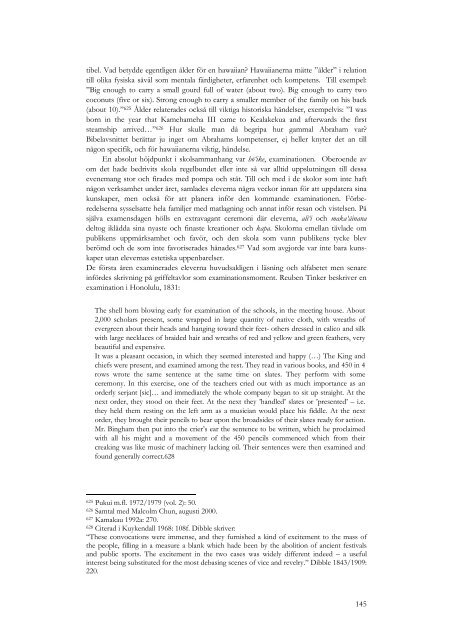"Who are you to tell us our history?" Kultur och religion i ... - Anpere
"Who are you to tell us our history?" Kultur och religion i ... - Anpere
"Who are you to tell us our history?" Kultur och religion i ... - Anpere
You also want an ePaper? Increase the reach of your titles
YUMPU automatically turns print PDFs into web optimized ePapers that Google loves.
tibel. Vad betydde egentligen ålder för en hawaiian? Hawaiianerna mätte ”ålder” i relation<br />
till olika fysiska såväl som mentala färdigheter, erf<strong>are</strong>nhet <strong>och</strong> kompetens. Till exempel:<br />
”Big enough <strong>to</strong> carry a small g<strong>our</strong>d full of water (about two). Big enough <strong>to</strong> carry two<br />
coconuts (five or six). Strong enough <strong>to</strong> carry a smaller member of the family on his back<br />
(about 10).” 625 Ålder relaterades också till viktiga his<strong>to</strong>riska händelser, exempelvis: ”I was<br />
born in the year that Kamehameha III came <strong>to</strong> Kealakekua and afterwards the first<br />
steamship arrived…” 626 Hur skulle man då begripa hur gammal Abraham var?<br />
Bibelavsnittet berättar ju inget om Abrahams kompetenser, ej heller knyter det an till<br />
någon specifik, <strong>och</strong> för hawaiianerna viktig, händelse.<br />
En absolut höjdpunkt i skolsammanhang var hō‘ike, examinationen. Oberoende av<br />
om det hade bedrivits skola regelbundet eller inte så var alltid uppslutningen till dessa<br />
evenemang s<strong>to</strong>r <strong>och</strong> firades med pompa <strong>och</strong> ståt. Till <strong>och</strong> med i de skolor som inte haft<br />
någon verksamhet under året, samlades eleverna några veckor innan för att uppdatera sina<br />
kunskaper, men också för att planera inför den kommande examinationen. Förberedelserna<br />
sysselsatte hela familjer med matlagning <strong>och</strong> annat inför resan <strong>och</strong> vistelsen. På<br />
själva examensdagen hölls en extravagant ceremoni där eleverna, ali‘i <strong>och</strong> maka‘āinana<br />
del<strong>to</strong>g iklädda sina nyaste <strong>och</strong> finaste kreationer <strong>och</strong> kapa. Skolorna emellan tävlade om<br />
publikens uppmärksamhet <strong>och</strong> favör, <strong>och</strong> den skola som vann publikens tycke blev<br />
berömd <strong>och</strong> de som inte favoriserades hånades. 627 Vad som avgjorde var inte bara kunskaper<br />
utan elevernas estetiska uppenb<strong>are</strong>lser.<br />
De första åren examinerades eleverna huvudsakligen i läsning <strong>och</strong> alfabetet men sen<strong>are</strong><br />
infördes skrivning på griffeltavlor som examinationsmoment. Reuben Tinker beskriver en<br />
examination i Honolulu, 1831:<br />
The shell horn blowing early for examination of the schools, in the meeting ho<strong>us</strong>e. About<br />
2,000 scholars present, some wrapped in large quantity of native cloth, with wreaths of<br />
evergreen about their heads and hanging <strong>to</strong>ward their feet- others dressed in calico and silk<br />
with large necklaces of braided hair and wreaths of red and yellow and green feathers, very<br />
beautiful and expensive.<br />
It was a pleasant occasion, in which they seemed interested and happy (…) The King and<br />
chiefs were present, and examined among the rest. They read in vario<strong>us</strong> books, and 450 in 4<br />
rows wrote the same sentence at the same time on slates. They perform with some<br />
ceremony. In this exercise, one of the teachers cried out with as much importance as an<br />
orderly serjant [sic]… and immediately the whole company began <strong>to</strong> sit up straight. At the<br />
next order, they s<strong>to</strong>od on their feet. At the next they ’handled’ slates or ’presented’ – i.e.<br />
they held them resting on the left arm as a m<strong>us</strong>ician would place his fiddle. At the next<br />
order, they brought their pencils <strong>to</strong> bear upon the broadsides of their slates ready for action.<br />
Mr. Bingham then put in<strong>to</strong> the crier’s ear the sentence <strong>to</strong> be written, which he proclaimed<br />
with all his might and a movement of the 450 pencils commenced which from their<br />
creaking was like m<strong>us</strong>ic of machinery lacking oil. Their sentences were then examined and<br />
found generally correct.628<br />
625 Pukui m.fl. 1972/1979 (vol. 2): 50.<br />
626 Samtal med Malcolm Chun, aug<strong>us</strong>ti 2000.<br />
627 Kamakau 1992a: 270.<br />
628 Citerad i Kuykendall 1968: 108f. Dibble skriver:<br />
“These convocations were immense, and they furnished a kind of excitement <strong>to</strong> the mass of<br />
the people, filling in a measure a blank which hade been by the abolition of ancient festivals<br />
and public sports. The excitement in the two cases was widely different indeed – a <strong>us</strong>eful<br />
interest being substituted for the most debasing scenes of vice and revelry.” Dibble 1843/1909:<br />
220.<br />
145







